Without music, life would be a mistake. ― Friedrich Nietzsche.
Music is one of the most refined forms of artistic creations and incorporates several elements. But the most important one of them is the talent and the devotion of the music composer.
So, what is a music composer? Who are the most famous composers of the world? Keep on reading to learn more about this topic.
What is a Music Composer?
A music composer is a person who writes music. The word has roots in Latin and basically means “to build.”
Composers mainly write and direct original music used to produce various types of media entertainment. Their musical creations help to tell a story in a film or video game.
The created soundtrack needs to be related to the characters’ development and their feelings.
Traditionally, music composers were people who wrote Classical music, whether it was instrumental or vocal. Later, the definition expanded to refer to all artists creating music in all music genres.
Composers of songs are called songwriters, and the person who writes the lyrics is called the lyricist. In most modern Western music genres, the roles of the songwriter and lyricist can be executed by the same person.
Music composition usually involves creating music notation or music sheet score, which the performer or singer later performs. In Classical music, music notation involves the orchestration or choosing of the instruments.
In Pop music and other modern genres, songwriting will determine the basic outline of the song with the melodies and chord progression.
Most modern composers usually create music using music notation, although some artists still don’t. Composers can exclusively write music for other artists. However, most modern composers are also talented performers.
In modern music, the roles of the composer and performer usually intertwine, as the performer provides the artistic interpretation of the notation written by the composer.
As a result, the final version of the music piece or song can be closely or loosely related to the original piece written by the composer, in what is known as the interpretation.
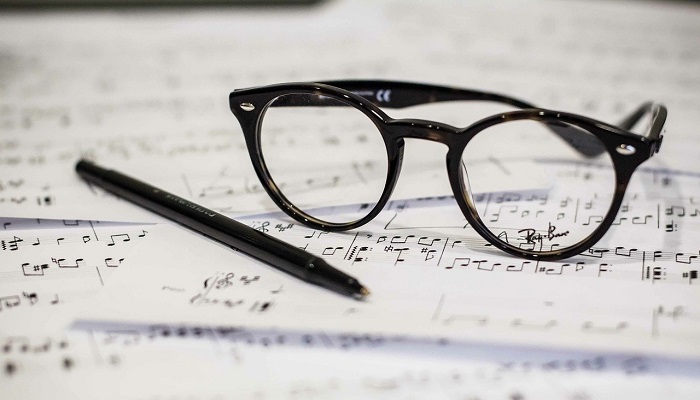
This effect is more widespread in modern music genres rather than the older ones. The musical notation sets the directions, while the performer can alter the final version by holding notes, adding pauses, or expressive effects like vibrato.
Different interpretations of the same piece of music can create entirely different music works by altering the tempo or instruments.
In Classical music, you find a single work of music written by several composers. However, this is more common in modern genres that feature collaborations between several artists or members of the same band.
For example, within the same band, one member can write the lyrics, while another could focus on the orchestration.
In the late 20th century, computer programs also started to contribute to music composition. Adding sound effects like natural sounds from the sea or wind, in addition to synthetic effects, is common Avant-Garde music.
When a composer writes original music, the notation or arrangement needs to be technically correct to help choruses, instrumental ensembles, and soloists deliver flawless performances.
The technical aspects of each recording, like melody, harmony, and rhythm, are of great importance and should blend perfectly.
In the case of creating an original soundtrack for a movie, composers need to discuss the requirements with the director, screenplay writer, or producer.
This will help them understand the tone of each scene and the characters’ feelings, so they can decide on what the music will be like.
Music composers travel between locations to seek solitude, so they can compose their music in peace or contact and discuss their creations with their clients and performers.
In some cases, modern composers usually work with different clients at the same time, whether they’re writing soundtracks for movies or songs. This means that they usually work for long, irregular hours.
Music Composition in Various Genres
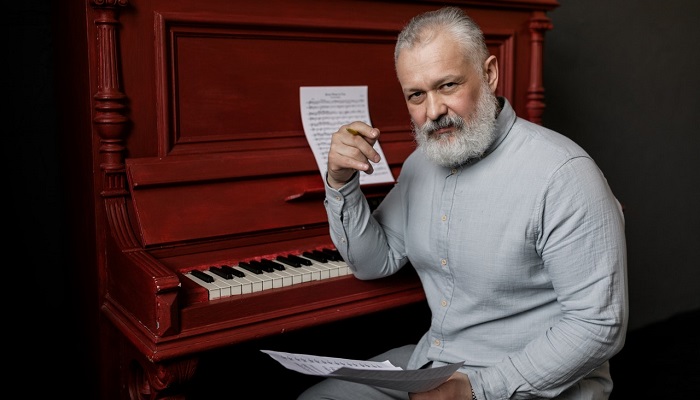
The individualism of music composition varies according to the period in which the music was written, the country, and overall culture.
In Medieval times and the early Classical period, performers usually added improvised ornaments to the melody during a performance.
Later, this freedom was put under control as composers were very specific about how their music needs to be interpreted.
Such emphasis created a culture where a composer and his artistic creation were highly valued, which led to the high status assumed by Classical music composers.
This is still followed in modern performances of older music compositions, especially in Classical music.
Music from the Baroque and Classical eras depended solely on acoustic and mechanical instruments, while Pop music used other electric and electronic instruments like the electric guitar or drum.
In newer genres, the performer usually has more freedom. This helped in the creation of covers of earlier popular songs.
In most cases, the solos’ overall orchestration and performance are altered as the cover is written to belong to a totally different music genre.
In Pop music, Rock music, and Jazz music, the performer usually composed the song in his head and didn’t use music notation at all.
Freestyle Jazz performers and later Hip Hop and Rock performers usually incorporated improvised additions to the composed piece that another artist might have written.
Their performances currently hold the same weight that Classical composers’ contributions held in Classical music.
Who Collaborates with Composers?
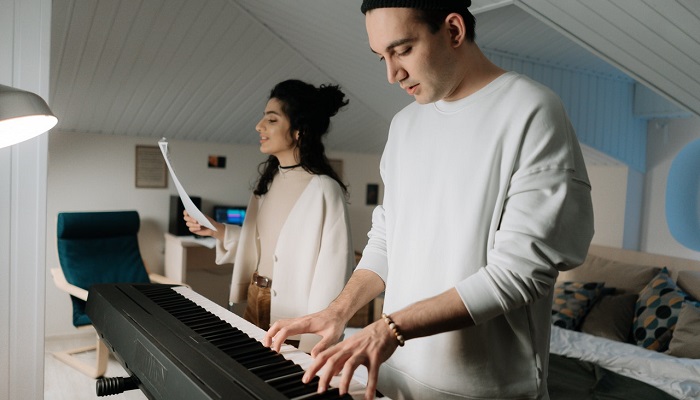
Up to the Classical and Romantic periods, composers were usually the musicians who brought the composition to life, although there were some notable exceptions.
Wagner wasn’t a good instrumentalist. Nevertheless, he managed to invent his very own instrument, the Wagner Tuba, which some musicians usually struggle to play well.
In modern times several artists cooperate with music composers to create original pieces for their projects. These include film and play directors, movie producers, commercial creators, video game creators, singers, and orchestra managers.
All these artists need the artistic touch of a talented music composer to bring their artistic creations to life. In some cases, the music plays the role of a crucial dialogue, and there are some notable examples that support this idea.
In the movie “Jaws,” film director Stephen Spielberg asked music composer John Williams to create a soundtrack that engages viewers with the movie, creating the feeling of being threatened without distracting them from the storyline.
As a result, Williams managed to incorporate patterns of two notes to mimic the threatening effect of the shark as it approaches in silence. This soundtrack became a classical piece that signifies the feeling of danger and discomfort.
Composers spend time with artists, study notes, and work on their creations in their studio or at home.
They also conduct rehearsals with musicians and other performers to direct and adjust performances until the score mimics the composer’s artistic vision.
In the past, music composers were always torn between introducing new trends and submitting to the norm. When they got too wild with their creations, they always had to consider the fear of having their work rejected by the public.
Nevertheless, some composers defied the norms and pushed music into new areas, basically creating a new genre or era.
Beethoven was one of these talented revolutionists, as his music didn’t fit into one category, unlike other composers of his time.

In one instance, his music was intimate and sweet, then it turned into something dramatic and shaking. He managed to change music in several ways.
For example, he set a new meaning for the word “symphony.” Before him, symphonies lacked the emotional aspect that marked his creations. The first movement of his Symphony No. 3 Eroica exceeds many symphonies in his time.
He was also the first composer to take ideas and transform them into music creations. His music didn’t follow the traditional forms and focused on emotions of the inner self, keeping his audience intrigued by the depths of the soul.
His approach was the ignition that drove music from the Classical to the Romantic era, where musicians were focused on expressing their feelings. In many ways, Beethoven is considered to be avant-garde of his time.
How Do You Become a Composer?
In the past, music composers were instrument players, usually harpsichord or piano players, who showed great talent in improvising and creating original music instead of just performing it.
Starting at a very young age, families usually helped their children become better at playing music by hiring skilled tutors, which later gave them the confidence to explore their creativity by writing new pieces.
Some of these musicians later grew to be the great composers that we all know of, usually creating a unique style that you can identify simply by listening to the tones and the orchestration.
However, in modern times, becoming a composer is slightly different. While there are still great composers who didn’t study music at all, most of the time, you’re required to get a degree to become a professional music composer.
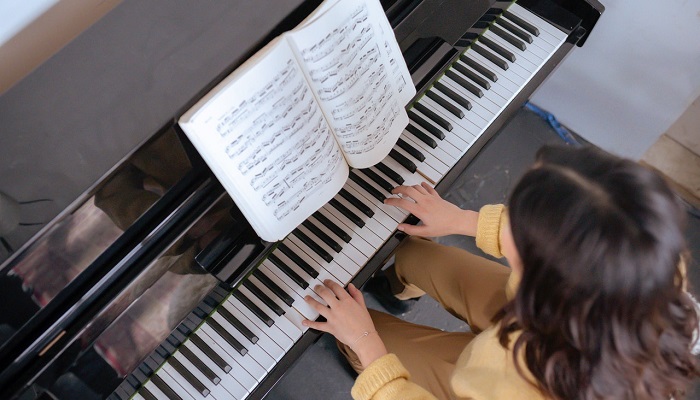
Nevertheless, without talent, the degree won’t work much. This means that your degree will complement your talent, but without the talent, the degree is worthless.
Modern music composers choose to get a Bachelor’s degree that involves studying the basics of Music Theory, notations, and orchestration.
However, most Pop, Rock, and Rap music composers don’t pursue a degree and still manage to achieve great success.
Most universities and colleges require applicants to interview and might be asked to showcase their talent by submitting their original compositions. Getting a Master’s degree represents a chance for expansion in your career as a professional composer.
In addition to education, there are several skills that can help you become a good music composer.
Musical Ability
This starts at an early age, as some children are born with natural talent that parents usually notice when they’re very young.
During their early years, most composers are part of bands or participate in concerts and choirs. Attending music summer camp is also a great idea to help improve their musical abilities.
These activities help young musicians improve their aural competency, exposing them to the points of strengths and weaknesses of every musical instrument.
During this period, it’s likely that the composer will develop a special bond with one instrument, although this might change in the future.
Arranging and Orchestration
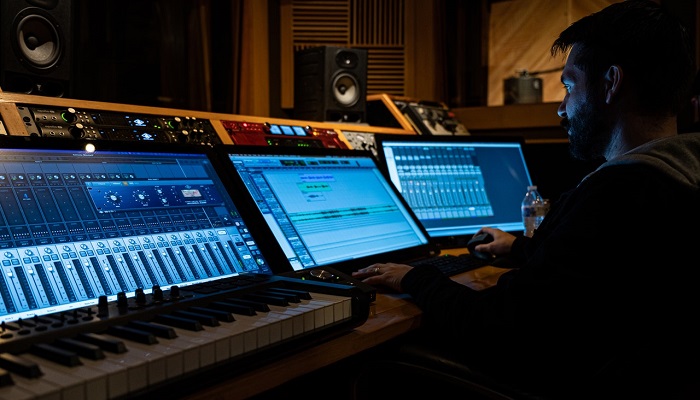
These two vital skills, although in modern music, orchestration has become slightly blurred. Nevertheless, if you’re ever asked to be someone’s orchestrator, it will come in handy.
Most music composers learn about orchestration by doing mockups or covers of original scores composed by other musicians. This can help them learn about the magnitude of every musical instrument and the role it plays in music composition.
Discipline
Your success as a music composer is closely related to the amount of discipline you show throughout your career, which usually starts at a young age.
While your music compositions might not be available commercially, your ability to push yourself will manifest as you work harder.
Composing takes a lot of work, and the great composers of all time composed tons of pieces, usually perfecting their original creations to develop something even better.
The time spent on creating each piece, listening to it, and checking it is never wasted, as it helps you develop your unique style as a music creator. Discipline is also crucial in learning music notation, which is significant in composing modern music genres.
Creativity
While you can learn discipline by pushing yourself a little harder every time, creativity is something you’re born with.
Good music composers usually see and feel things differently and are able to transform these unique feelings into tunes and notes that tell a story.
But “creativity” is a slightly broad term that can be interpreted in several ways. Some of the great composers of the Classical era “borrowed” work from others. For example, Mozart borrowed a whole symphony from Haydn for study purposes.

Handel has always been criticized for pilfering from other composers of his time, usually adding elements that made the piece totally different, although, to some experts, this practice was highly frowned upon.
In some cases, musicians like Beethoven borrowed pieces from their own older creations, improved them, and created something new.
Music composers have always been known to get affected by other artists, but this shouldn’t hinder you from creating a unique style that characterizes your work.
Communication
The old image of the lone composer of the Romantic era is no longer valid as modern composers need to communicate with other artists in the business to learn, criticize, appreciate, and influence.
The correspondence between Mahler and Strauss shows the strong relationship between these two composers.
As a composer, your job is to create music that other performers can perform. In addition to your music notation, you should be able to communicate your ideas to performers, so they can play your music the way you intended it.
Marketing your work as a composer is another skill that you need. With proper communication, you can build long-term relationships with media artists to create several collaborations.
The Greatest Composers of All Times
In ancient times, the importance of the composition of music varied depending on several issues, including the period and the genre of music.
In some music genres, the composer, arranger, and performer have blurred roles that are usually confused with each other.
Music was a crucial aspect of ancient cultures, including Ancient Egyptian, Ancient Greek, and Ancient Chinese cultures, where music was usually composed for religious purposes and entertainment purposes.
Pre-Classical Era Composers
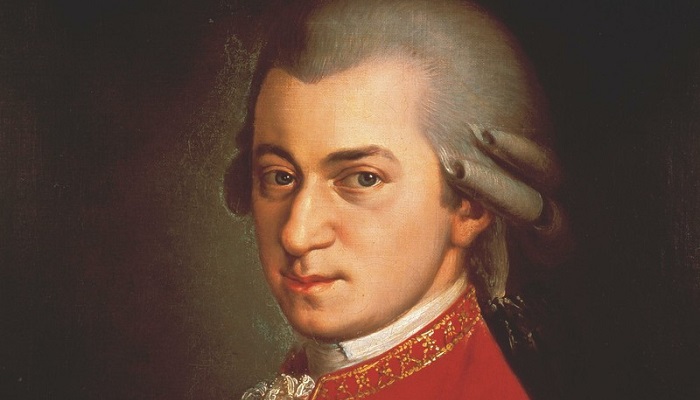
In Medieval times, music was mainly composed for chanting into the Roman Catholic Church services. However, composers also composed other songs for entertainment purposes.
In the Renaissance era, composers usually wrote songs about courtly love. This era also marked the spread of music notation, which helped make composer’s musical styles more popular.
Music was typically played in royal courts and noble houses, where the royalty usually looked for and sponsored the most talented composers. Composers of this era include Giovanni Pierluigi da Palestrina, Josquin des Prez, and William Byrd.
During the Baroque era, composers included more complex musical elements while getting inspired by ancient music styles. During this era, composers founded the Opera style and Contrapuntal music.
Classical Era Composers
Composers of this era studied the art of Ancient Rome and Greece and focused on creating a balance between the elements of music. They wrote religious music but focused on creating a lighter and less complex style.
Public concerts became popular during the Classical era, which helped composers gain fame and a good status in society. They were no longer employees in the palace but rather lived independently and were treated like celebrities. Wolfgang Amadeus Mozart is one of the biggest names in this era.
Romantic Era Composers
During the Romantic era, composers created more dramatic pieces and added more power to their music to describe deeper feelings.
Composers focused on creating dramatic tension to create more complex and usually longer musical pieces. They also added more instruments to create a more powerful sound. The most famous composers of this era are Ludwig van Beethoven, Johann Strauss II, and Pyotr Ilyich Tchaikovsky.
Female Composers

Before the 20th century, female composers had a difficult time getting the credit they deserved. Music was mainly written for the church, and women were unable to showcase their talent and get adequate recognition.
Some exceptions included Nun Hildegard von Bingen, who was also a philosopher and writer.
Post-Classical Composers
The Post-Classical era was powered by the Industrial Revolution and the Immigration to the New World.
As a result, this created the need for more original music genres. Music pieces were recorded and made widely available for study and entertainment purposes.
Composers in the Post-Classical era are ranked based on their originality and the extent they managed to take their music works into new directions.
They’re also ranked according to their impact and influence on the music scene throughout their lifetime and the years that followed. Their craftsmanship and brilliance in construction music are also taken into consideration.
In the 20th century, musicians were able to create new genres, like Astor Piazzolla, who is widely known as the foremost composer of Tango music.
John Cage is one the most influential figures in modern music and a leading figure in the Avant-Garde genre.
His famous work includes the silent piece 4’33”, for which musicians shouldn’t play their instruments, allowing the audience to listen to the sounds of their environment.
Hans Zimmer is a German composer, record producer, musician, conductor, and film score producer. His music combines elements from Contemporary, Classical, as well as Electronic music.
Up till now, Zimmer has been nominated to several awards for composing music for over 150 films. He has received one Academy Award, in addition to Golden Globe Awards, Grammy Awards, and Classical Brit Awards.
Influence from his music was adopted by other music composers. For example, the horn sound in his music score for “Inception” was later used in other movies.







